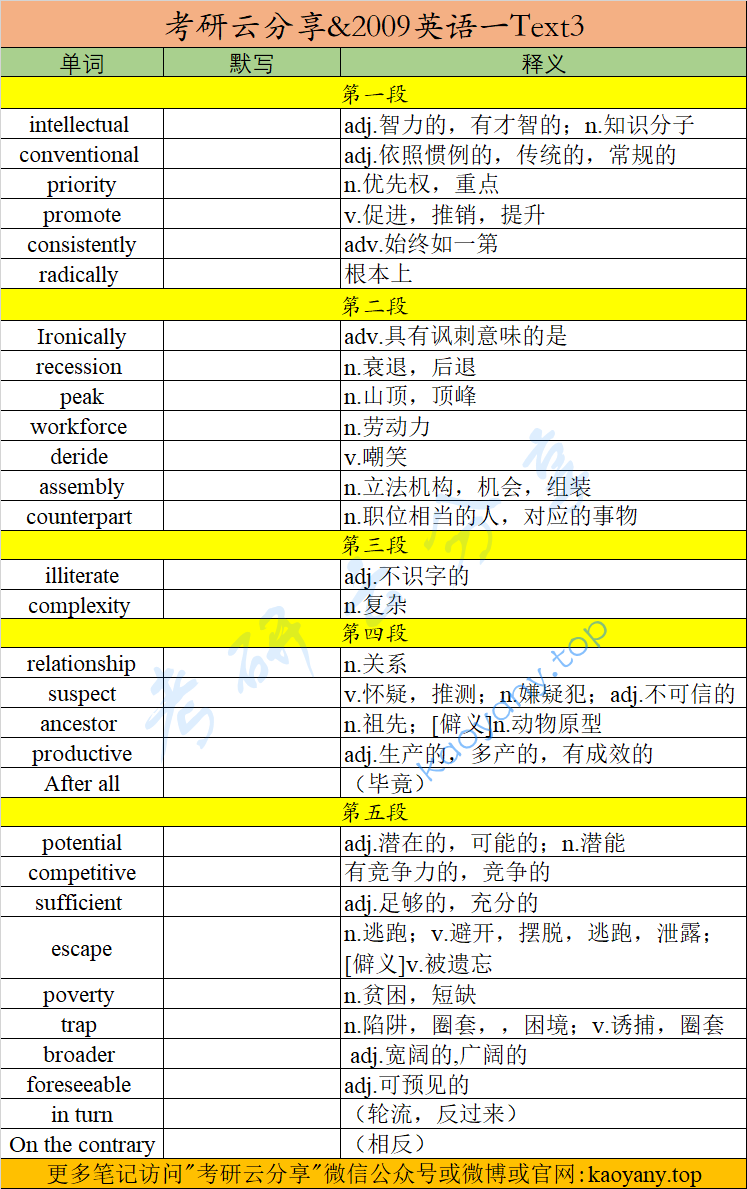第一段
The relationship between formal education and economic growth in poor countries is widely misunderstood by economists and politicians alike. Progress in both areas is undoubtedly necessary for the social, political, and intellectual development of these and all other societies; however, the conventional view that education should be one of the very highest priorities for promoting rapid economic development in poor countries is wrong. We are fortunate that it is, because building new educational systems there and putting enough people through them to improve economic performance would require two or three generations. The findings of a research institution have consistently shown that workers in all countries can be trained on the job to achieve radically higher productivity and, as a result, radically higher standards of living.
单词&词组搭配
intellectual [ˌɪntəˈlektʃuəl](常用词)adj.智力的,有才智的;n.知识分子
conventional [kənˈvenʃənl](出现6次)adj.依照惯例的,传统的,常规的
priority [praɪˈɔːrəti](出现8次)n.优先权,重点
promote [prəˈmoʊt](出现12次)v.促进,推销,提升
consistently [kənˈsɪstəntli](出现3次)adv.始终如一第
radically [rædɪkli](出现9次)根本上
本段翻译
经济学家和政治家都普遍误解了贫穷国家的正规教育与经济发展之间的关系。毫无疑问,这两个领域的进步对这些国家及其他国家的社会、政治和学术发展是必不可少的;但是,传统观点认为教育应该是促进贫穷国家经济快速发展最首要的考虑因素之一,这种观点是错误的。我们庆幸它不对,因为在那里建立新的教育制度并且让足够多的人接受这种教育从而提高经济效益,这需要两三代人的时间。一家研究机构的研究成果一再表明:所有国家的工人都可以通过在职培训来获得生产力的根本性提高,最终彻底提高人们的生活水平。
第二段
Ironically, the first evidence for this idea appeared in the United States. Not long ago, with the country entering a recession and Japan at its pre-bubble peak, the U.S.workforce was derided as poorly educated and one of primary causes of the poor U.S. economic performance. Japan was, and remains, the global leader in automotive-assembly productivity. Yet the research revealed that the U.S. factories of Honda, Nissan, and Toyota achieved about 95 percent of the productivity of their Japanesecounterparts — a result of the training that U.S. workers received on the job.
单词&词组
Ironically [aɪˈrɑːnɪkli] adv.具有讽刺意味的是
recession [rɪˈseʃn](出现2次)n.衰退,后退
peak(出现3次)n.山顶,顶峰
workforce [ˈwɜːrkfɔːrs] n.劳动力
deride [dɪˈraɪd] v.嘲笑
assembly [əˈsembli](出现3次)n.立法机构,机会,组装
counterpart [ˈkaʊntərpɑːrt](出现7次)n.职位相当的人,对应的事物(这个词在05年T1出现了)
本段翻译
讽刺的是,这一观点最先在美国得到证明。不久前,随着美国经济进入衰退期,日本处于泡沫破裂前的经济高峰期,美国劳工被嘲笑为教育水平低下的人,并且被嘲笑地认为是造成美国经济效益不佳的主要原因之一。日本从过去到现在一直在汽车装备生产率上保持全球领导地位。然而,研究表明本田、尼桑和丰田这三家厂商在美国所开的工厂达到了他们在日本的工厂的生产率的95%,这是美国工人接受在职培训的结果。
第三段
More recently, while examing housing construction, the researchers discovered thatilliterate, non-English-speaking Mexican workers in Houston, Texas, consistently met best-practice labor productivity standards despite the complexity of the building industry’s work.
单词&词组
illiterate [ɪˈlɪtərət] adj.不识字的
complexity [kəmˈpleksəti] n.复杂
本段翻译
更近些时候,在进行房屋建设调查时,研究人员发现在德克萨斯州的休斯顿,尽管建筑行业的工作十分复杂,但是未受过教育且英语不是母语的墨西哥工人总是能够达到劳动生产率的最佳实践标准。
第四段
What is the real relationship between education and economic development? We have tosuspect that continuing economic growth promotes the development of education even when governments don’t force it. After all, that’s how education got started. When ourancestors were hunters and gatherers 10,000 years ago, they didn’t have time to wonder much about anything besides finding food. Only when humanity began to get its food in a more productive way was there time for other things.
单词&词组
relationship [rɪˈleɪʃnʃɪp](出现13次)n.关系
suspect [ˈsʌspekt](出现3次)v.怀疑,推测;n.嫌疑犯;adj.不可信的
ancestor [ˈænsestər](出现9次)n.祖先;[僻义]n.动物原型
productive [prəˈdʌktɪv](出现8次)adj.生产的,多产的,有成效的
After all(毕竟)
本段翻译
教育与经济发展之间的关系到底如何?我们不得不怀疑,即便政府不强制推行教育,持续的经济增长也会促进教育发展。毕竟,教育就是这样开始的。一万年前,当我们的祖先还在狩猎和采集时,除了寻找食物,他们没有时间去考虑其它更多的事情。只有当人类开始更高效地获取食物时,才有时间做其它的事情。
第五段
As education improved, humanity’s productivity potential increased as well. When thecompetitive environment pushed our ancestors to achieve that potential, they could in turn afford more education. This increasingly high level of education is probably a necessary, but not a sufficient, condition for the complex political systems required by advanced economic performance. Thus poor countries might not be able to escape theirpoverty traps without political changes that may be possible only with broader formal education. A lack of formal education, however, doesn’t constrain the ability of the developing world’s workforce to substantially improve productivity for the foreseeablefuture. On the contrary, constraints on improving productivity explain why education isn’t developing more quickly there than it is.
单词&搭配
potential [pəˈtenʃl](出现23次)adj.潜在的,可能的;n.潜能
competitive [kəmˈpetətɪv](出现16次)有竞争力的,竞争的
sufficient [səˈfɪʃnt](出现2次)adj.足够的,充分的
escape [ɪˈskeɪp](出现9次)n.逃跑;v.避开,摆脱,逃跑,泄露;[僻义]v.被遗忘
poverty [ˈpɑːvərti](出现10次)n.贫困,短缺
trap [træp](出现4次)n.陷阱,圈套,,困境;v.诱捕,圈套
broader [ˈbrɔdər] adj.宽阔的,广阔的
foreseeable [fɔːrˈsiːəbl] adj.可预见的
in turn(轮流,反过来)
On the contrary(相反)
本段翻译
随着教育的进步,人类的生产潜力也增加了。当竞争环境促使我们的祖先去实现这种潜能时,他们反过来又能负担起更多的教育。经济效益的提高需要复杂的政治体制,而这种日益提高的教育水平可能是建立这种政治体制的必要而非充分条件。因此,没有政治改革,贫穷国家可能就无法摆脱其贫困困境,政治改革则只有在更广泛的正规教育的条件下才可能实现。但是,正规教育的缺乏并没有限制发展中国家的劳动力在可预见的未来大幅提高生产效率的能力。相反,生产率的提高受到限制则解释了为什么那里的教育没有比现有的速度更快。
5道题目
31. The author holds in paragraph 1 that the importance of education in poor countries ___.
[A] is subject to groundless doubts
[B] has fallen victim of bias
[C] is conventionally downgraded
[D] has been overestimated
32. It is stated in paragraph 1 that the construction of a new education system _______.
[A] challenges economists and politicians
[B] takes efforts of generations
[C] demands priority from the government
[D] requires sufficient labor force
33. A major difference between the Japanese and U.S workforces is that _______.
[A] the Japanese workforce is better disciplined
[B] the Japanese workforce is more productive
[C] the U.S workforce has a better education
[D] the U.S workforce is more organize
34. The author quotes the example of our ancestors to show that education emerged ______.
[A] when people had enough time
[B] prior to better ways of finding food
[C] when people on longer went hungry
[D] as a result of pressure on government
35. According to the last paragraph, development of education ________.
[A] results directly from competitive environments
[B] does not depend on economic performance
[C] follows improved productivity
[D] cannot afford political changes
选项单词
groundless [ˈɡraʊndləs] adj.无理由的
bias [ˈbaɪəs] 偏见
downgrade 低估
overestimate [ˌəʊvərˈestɪmeɪt] 高估
take efforts of (努力)
discipline [ˈdɪsəplɪn].(出现16次)n.纪律,学科,处罚
参考答案
DBBCC

- 单词 词组搭配
- 本段翻译
- 单词 词组
- 本段翻译
- 单词 词组
- 本段翻译
- 单词 词组
- 本段翻译
- 单词 搭配
- 本段翻译
- 5道题目
- 选项单词
- 参考答案
